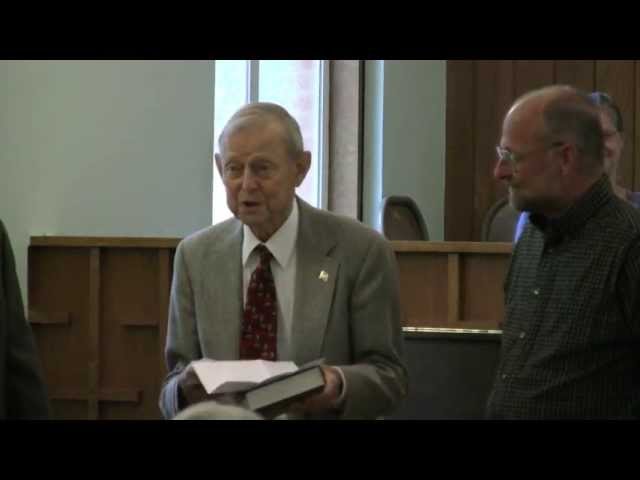Cyrus Baldwin King, a gentle spirit with an iron resolve, was a hero of North Carolina’s peace and justice movement. The Council of Churches is honored to join in the many tributes that have come his way at his passing.
Cy died on June 25 at the age of 91 – after a life of deep commitment to principles that lie at the Council’s bedrock.
He worked to advance the cause of a world free of weapons of mass destruction, a world in which disputes could be resolved without bloodshed.
He worked to promote racial harmony during years in which that harmony often was elusive.
He worked to shore up civil liberties even when it meant defending unpopular causes, because he took seriously this nation’s claim that individual freedoms matter.
For many years, Cy and his late wife, Carolyn, were a tandem in their peace and justice activism. Their persistence and effectiveness were acknowledged in their selection for membership in the Raleigh Hall of Fame – a fitting honor accorded to the Kings by the city where Cy lived his life.
Yes, there was that little interruption during World War II. In the midst of his undergraduate stint at UNC-Chapel Hill, Cy answered the call of duty and served three years as an infantryman in Europe, fighting in the Battle of the Bulge. One can only imagine the hardships he endured and the grim scenes he witnessed.
But out of that experience grew Cy King’s lifelong dedication to the cause of peace – a cause that brought him to weekly demonstrations in front of the downtown Raleigh post office by a small corps of loyal peace activists.
This was during an era when it was not unrealistic to think that the future of humankind itself hung in the balance, with the nuclear arms race seeming to point toward some inevitable catastrophe. But it never happened. Did the peace advocacy of Cy and his allies in North Carolina and elsewhere help alert Americans to the true dangers and moral challenges of a world overrun with nuclear weapons and the means to deliver them? This is certain: It couldn’t have hurt.
On the march
Cy and Carolyn King also were among the pillars of Raleigh’s civil rights community, dating back to the early 1960s, when progressive views on race relations were by no means the norm.
If there was a march or a demonstration intended to push the causes of equal rights and equal opportunity for all, the Kings could be counted upon to show up. Indeed, as was noted during the overflowing memorial service held for him on July 1 at Raleigh’s Community United Church of Christ, Cy didn’t consider himself a leader in the causes he supported, but he took pride in being a “shower-upper” whose aim was to “Keep on keepin’ on!” Those who attended the service understood that this quiet determination and energy were what in fact made him a leader who led by example and the force of his ideals.
Cy’s career was at NC State University, where he became a top acquisitions official at the main library, a job consistent with his thoughtfulness. Meanwhile, his competitive streak showed on the tennis court; he played at a high level for decades.
As the years rolled on and as Cy and Carolyn with every march, every phone call, every letter to the editor added to their legacy of progressive activism, the honors accumulated. Among them was the Council of Churches’ award for Distinguished Service in the Mission of Ecumenism, Justice and Peace, given to the couple in 2009. That same year marked their induction into Raleigh’s Hall of Fame.
Carolyn’s death in 2012 meant that Cy would undertake the final phase of his noble work without his beloved partner. But even as age took its toll, he would not miss out on the series of protests that took shape last year as state government lurched to the right following a conservative takeover. The Moral Monday events led by the state NAACP may have run their course for now, but Cy being escorted in his wheelchair was a well-recognized figure at the events this spring.
Among speakers at the memorial service was the Rev. Collins Kilburn, a former pastor at the church now known as Community United Church of Christ and executive director emeritus of the Council of Churches.
Kilburn placed Cy King squarely within the social gospel tradition that flows from an understanding of Jesus’ concern for the weak, the poor, the dispossessed. His eulogy pointed to Cy’s faith that “the universe is on the side of justice.” It was a faith that carried him through a life of advocacy that is an inspiration to us all.

